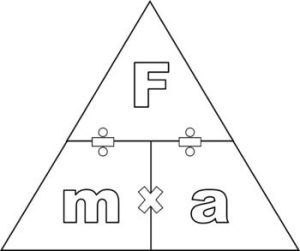If you doubt and do not know how to convert Nm to joules, this CalCon calculator will help you. It is a tool that allows you to convert force units, whether you choose newtons to joules or joules of newton meters. Below you can find all the answers to the questions that revolve in your curious mind. We will also explain the conversion method and what is happening “behind the scenes” of our calculator. Given your interest in this calculator, we recommend that you also look at CalCon’s Nm to the ft-lbs convertor. With this converter, you can easily convert Nm to ft-lbs.
What is a Joule in Newtons?
The concept of joules as units of measurement in the International System of Units is defined as the realized energy transferred to a particular object under a force of 1 newton applied to that object at a distance of 1 meter. We can present this as follows:
1 joule of work = 1 N of force x 1 m of distance
or
From this math expression, we conclude that the ratio of newtons and joules as units of measurement is 1:1. As a unit of measurement, Joule has the designation J because it is named after the famous physicist and mathematician James P. Joule. He contributed a lot to thermodynamics and the law of conservation of energy. We can relate an example of the use of joules in practice to the situation when we use specific power to lift an object, the heat needed to raise the temperature, or when it comes to reading the kinetic energy of objects. Energy measurement can apply in everyday life in various places, whether shopping for groceries or to more severe and complex jobs.
When we talk about newtons, 1 newton measures the force required to accelerate an object weighing one kilogram by one meter per second squared. The law tells us that the greater the force used on an object, the more newtons it will result. All the forces acting on the object at that moment are in balance with each other.

One of the ways to express joules is through the newton meter, which we use as a unit for the moment. According to all theories, these two units differ in many parameters, but we can convert one into another. In this regard, we use the unit of newton meter as a designation for a unit of work equal to the value in joules or unit of energy.
How to convert Newtons to Joules?
Now it is time to explain how our calculator works and how you can get the results you want. All you need to know is these units 1:1 ratio. Whichever direction of conversion you choose, the essence is to multiply a specific value by the number 1 to get the value of another unit of measurement. Like all other calculators we present to you, our calculator has precisely marked fields where you need to enter values. So if, for example, you want to calculate how much is 8-newton meters in joules, you enter a value in the blank field, and you get that value equal to 8 joules.
Convert Joules to Newtons
We can also run the conversion process opposite, i.e., turning the joules into newton meters. Then we need to have specific theoretical knowledge and the values we want to calculate. A formula that directly links these two values, and will make our calculation easier is:
J = N\cdot mTherefore, in this case, the logical conclusion will be that we can convert the joules value by multiplying by 1 to get the value in newton meters. It means that 1J is equal to 1Nm.
FAQ?
1. Does 1Nm equal a Joule?
Before answering this question, it is necessary to know that the ratio of joules to newton meters is 1: 1. Therefore, the logical conclusion is that the value of one Joule is equal to the value of one-newton meter, and vice versa.
2. How many Newtons is 5 Joules per meter?
The process of converting 5 newtons into joules is straightforward. Multiplying the newton by the number 1, we get that 5 newtons equal 5 joules.
3. Can I convert Newton meters to Joules?
The answer is yes! The ratio of these two units also applies when converting newton meters to joules. Just multiply the value of Newton meters by one, and you get the value in joules.
